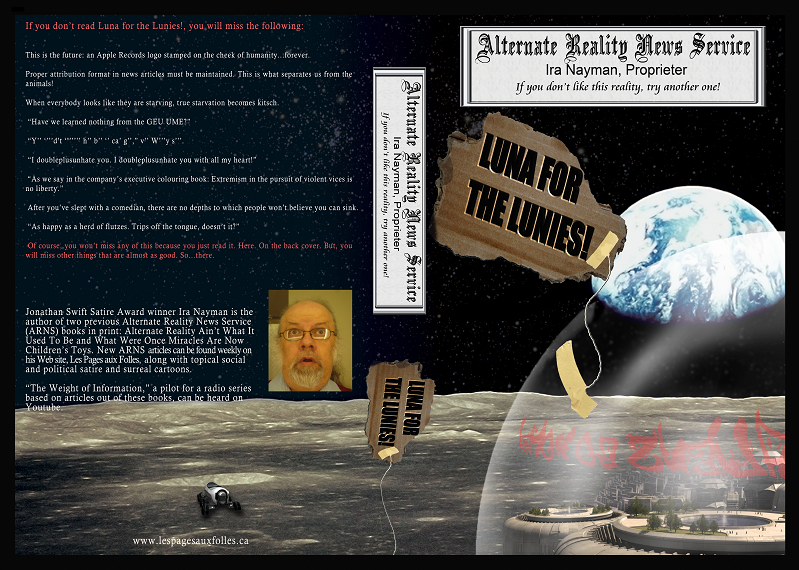by FREDERICA VON McTOAST-HYPHEN, Alternate Reality News Service Pop Culture Writer
Where does the time go? Why do fools fall in love? Does your chewing gum lose its flavour on the bedpost overnight? There are some questions that science simply cannot answer. However, science may be close to answering a question that nobody had even thought to ask: what happens to the humour of a joke that has become dated?
“Suppose you make a joke about…oh, I don’t know…Lindsay Lohan,” stated University of Toronto, Belarus campus humourology professor Mariya Stefanovna Sikorskaya, author of the well regarded in certain circles study The Diaper: The Seat of All Humour.
When I objected, pointing out that much of the criticism of Lindsay seemed to be a case of journalistic piling on, Stefanovna Sikorskaya responded, “Okay. Umm…sure. It doesn’t have to be Lohan. The point could be made with a joke about…Jesse Eisenberg.”
I objected to this, too. Jesse had starred in Zombieland, and killing zombies was no joke, lady! Stefanovna Sikorskaya sighed. “Right. How about…umm…Theda Bara?”
Who?
“Exactly!”
Seeing the puzzled expression on my face, Stefanovna Sikorskaya decided to switch tactics and, putting herself on speaker phone to make talking in funny voices easier, told the following joke:
XENOPHOBOS: Did you put the antrobus on the fectrum?
REBUSKENEBUS: I tried, but the eff luvium got in the way!
XENOPHOBOS: Oh, really! I cannot trust you to do the simplest thing! Now, how do you expect to change the diaphater?
REBUSKENEBUS: Standing behind the duck on my hands and knees?
This is a joke from Aristotle’s lost book on comedy, The Diuretics. To understand the joke, we would need to know the meaning of the words “antrobus,” “fectrum” and, of course, “duck.” Unfortunately, there is no way of translating those words; although some researchers have tentatively identified a meaning for the word duck, they immediately rejected it as being too rude for academic papers.
“At one time,” Stefanovna Sikorskaya pointed out, “people laughed their asses off at this joke. Literally. The Greeks had a person, the enuskulator, whose job it was to sweep the asses off the streets – they got under the hooves of the horses and caused terrible traffic accidents. An urn that depicts a 27 chariot pile-up was recently found in mystic Connecticut. The whole asses thing might have had something to do with their diet – but, I digress…
“The question is: where did the humour in the joke – in any joke that we no longer find funny – go?”
The answer is: the humour has gone to another dimension.
Stefanovna Sikorskaya based this idea on the Electrum Xenobia Postulate (named after the late lexicographer Philip de la Guarta), which reads: “The half-life of a joke is proportionate to its relationship to popular culture.” The mathematical formula on which this postulate is based is 600 pages long (I’ll bet de la Guarta’s thesis committee just loved him!), but the basic premise is ridiculously easy to state: a joke will lose its ability to get a laugh in direct proportion to how closely it is tied to something in the popular culture.
Or, to be more accurate, Stefanovna Sikorskaya based her idea on the Frequent Flyer Corollary to the Electrum Xenobia Postulate: “Comic meaning is never lost, it is merely transformed into Fenster Liuvium.” Fenster Liuvium is a massless sub-atomic thingie that sometimes acts like a particle and sometimes acts like an antacid tablet. Fenster Liuvium was discovered by accident – no, actually, it was discovered by scientists at the Large Hadron Collider. Smashing sub-atomic particles at near light speeds, they captured an emission on an unexpected frequency. Amplified a kajillion times, the emission turned out to be laughter.
Since this discovery, Stefanovna Sikorskaya has proposed the Stefanovna Sikorskaya Deviation of the Frequent Flyer Corollary to the Electrum Xenobia Postulate: “Free-floating Fenster Liuvium escapes our dimension through black holes.” Stefanovna Sikorskaya believes that when Fenster Liuvium drops through the event horizon of a black hole, there is an emission identical to the one identified by the Large Hadron Collider.
Have you ever felt like the universe was laughing at you? This would seem to suggest that, on the sub-atomic level at least, it is.
Did she use her Home Universe GeneratorTM to look for the universe where the humour in the jokes went? “Of course,” Stefanovna Sikorskaya answered. “All I got back were ads for creams that could help me be a hit with the ladies. How did it know? HOW DID IT KNOW?”
How, indeed? Perhaps science is just catching up to an old piece of folk wisdom: the universe always gets the last laugh.


